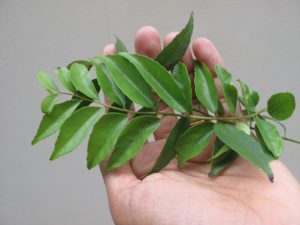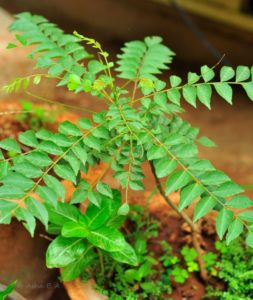Curry leaves or kadi patta, as it is also known, is a staple in Indian dishes. The curry leaf is humble when compared to fancier aromatic herbs like cilantro, coriander, thyme, rosemary etc., but curry leaves add that pizzazz and a powerful punch and flavour to any dish they are added to.
Curry leaves are a common and extremely easily available seasoning that has not received its proper status in the international culinary world as it is a lesser known seasoning in the Western world. It always plays the part of a supporting hero in a dish rather than the star of the dish.
Curry leaves have a spicy, lemon like and bitter flavour that cannot be replicated with any other ingredient. Curry leaves are best in flavour when used fresh. Dried curry leaves have virtually no fragrance and taste and a common misconception is to substitute curry powder. The truth is that curry powder has no curry leaves, it is, in fact, a melange of different spices.
Occasionally, I have experimented using curry leaves with my roast meats instead of traditional herbs like rosemary or thyme and I must say I was pleasantly surprised. It tasted great with roast chicken! Also, a light tadka of mustard seeds and curry leaves with plain grilled fish is also delicious. But then I am quite a fan of the curry leaf. It also pairs well with roast potatoes and sour cream.
The curry leaf tree starts small but grows quite tall with a trunk, often reaching a height of about 13-30 feet. The leaves grow with about 11 or 21 leaflets to a branch. The plant also produces small white flowers, which can self-pollinate to produce small shiny black berries or fruits containing a large viable seed. Though the berry pulp is edible- it has a sweet but medicinal flavour- in general, neither the pulp nor the seed is used for culinary purposes.
Try including curry leaves in your day-to-day daily cooking and please don’t discard the leaves whilst eating but eat them for a healthier life. Also, encourage your children to eat curry leaves for all their health benefits so by the time they are old enough they will have been habituated to eating curry leaves daily.
Properties and benefits
Properties and benefits of #curryleaves
Because of its aromatic properties, curry leaves have vast uses in soap making, body lotions, potpourri, room fresheners, body fragrances, perfumes, bath and massage oils, aromatherapy, spas, incenses’ and hair treatments. The essential oil found in curry leaves are believed to slow down the greying of hair.
The plant has been extensively used in traditional medicines in eastern India. The essential oil extracts from the leaves and seeds have antibacterial and antifungal properties. The root and bark are also used for medicines as they are a stimulant.
The health benefits are innumerable as curry leaves are packed with carbohydrates, fibre, calcium, phosphorus, iron and vitamins like vitamin C, vitamin A, vitamin E. Curry leaves help your heart function better and fight infection and enliven your hair and skin with vitality.
As curry leaves are a rich source of iron and folic acid, which is mainly responsible for carrying and helping the body absorb iron as curry leaves are a rich source of both the compounds, it is one stop natural remedy to beat anaemia.
Not only do curry leaves help in lowering the blood sugar levels, but also help to keep them in check for a few days after the administration of curry leaves. Curry leaves help your blood sugar levels by affecting the insulin activity of the body and reduces one’s blood sugar levels.
The type and amount of fibre contained within the leaves plays a significant role in digestion and altering the way your body absorbs fat, thereby helping you control your weight. Since weight gain is one of the leading causes of diabetes, curry leaves treat the problem of the root.
Curry leaf juice is supposed to be good for digestion as well as aiding in controlling acidity. A decoction of curry leaf root and ginger is beneficial for stomach aches. Curry leaf paste mixed with buttermilk is very effective for a stomach upset.
Curry leaf juice with cardamom powder is said to be a home remedy for urinary problems.
Curry leaf powder with lemon juice and a little jaggery is a natural remedy for controlling morning sickness. Dried curry leaves consumed with hot water or milk help to cure chronic anaemia.
Stay tuned in for recipes with curry leaves.

Pin it for later


